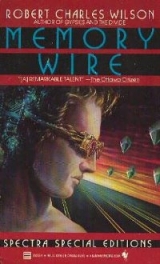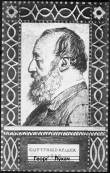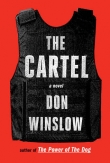
Текст книги "Memory Wire"
Автор книги: Robert Charles Wilson
Соавторы: Robert Charles Wilson
Жанры:
Научная фантастика
,сообщить о нарушении
Текущая страница: 13 (всего у книги 14 страниц)
CHAPTER 24
Teresa was watching the sun go down when she resorted to the pills again.
She had climbed to the top of this raggedy float shack with the pills in her pocket, not intending to swallow any —the desire was never that explicit—but just holding them in reserve, savoring their reassuring closeness. She wore a sweater. Coming on winter now. The nights were early and cool. She sprawled across the tin roof with her back against a heat exchanger, feeling the thrum of the bilge pumps and watching the western sky fade to red.
She took out a handful of pills and regarded them.
They were small, black, unmarked, faintly resinous. Faintly sordid. They had been cooked, she thought, in some Float laboratory, formed in a primitive pill press, sold furtively to addicts … to her.
But she needed them. It was not a question of self-indulgence. It was as if her traumatic ’lith trance in the Ver-o-Peso had opened old wounds: she needed the anesthesia. She had dreamed about the little girl, increasingly felt her as a tangible presence, scolding and demanding. Now, for instance. Now the little girl wanted her to throw the pills away. Her voice was a real voice, faint but distinct.
I saved your life.
But that was crazy.
In the fire. You would have died. You wanted to die. I saved your life.
Mysteriously, she had become two people.
I saved your life. You took the pills, t made the sculptures. You sold them…
No, Teresa thought.
She took several of the pills into her mouth and swallowed them dry, choking a little. Too many, maybe. But they made the voice fade away.
The euphoria began as a sense of lightness spreading from her stomach. It was inside her, until it reached her head, and then she was inside it; the euphoria contained her perfectly. The sky was dark now, the wind from the tidal dam chilling, but she didn’t care. She wrapped the sweater over her shoulders and leaned back, breathing in a deep, steady rhythm. All over the Floats lanterns were flickering on. A fog rolled down the canals.
She was oblivious when she heard Byron’s voice as he entered the float, arid Cruz Wexler’s following, their conversation—they must not have known she was up here—like a tired duet between broken instruments. It was funny, she thought, how sad they sounded. How hopeless and resigned. She closed her eyes and listened to the sound of their voices, the last night cries of nesting gulls. There were high lunar tides out beyond the dams, fresh water from the spillways creating a gentle, pulsing swell. The shack rocked under her. She sighed, alone in this luminous darkness. All voices stilled, she thought. What a blessing silence was.
But then—moved by some muted note of alarm deep within her—she sat up and saw the lone man approaching down a boardwalk from the east.
It was later than she had realized, most of these balsas dark now, only a dim glow from the dance shacks out along the seawall. The man walked methodically and with an air of intense, frightening vigilance. He came alongside the shanty float. He stopped. Teresa, on the flat tin roof, ducked out of his line of vision.
Death at the door, she thought.
It was a strange idea but she considered it calmly. Death had always been at the door. Since the fire, so many years ago. She had been courting him. Seducing him. What was remarkable was that he had taken so long to get here.
She listened to him knock.
CHAPTER 25
Keller lay for a time on the verge of the road by the ancient oilfield.
The sun raked over his closed eyes; he saw starbursts. The gravel under him felt as acute as knives and razors. When an airliner passed overhead, the roar was a demented music.
He wanted to move but could not.
He was lucid for moments at a time, but even his lucidity was painful: an acute, exaggerated sobriety in which the world invaded his senses.
He understood what was happening to him. Oberg had plugged something into his socket, something like a joychip but more intense, something that was sending him rapidly into burn-out. It was clever. A clever kind of murder. If no one found him, he would die; dead, he would look like any other burn-out case. If he were discovered here before he died, he would be mistaken for terminal and remanded to a death ward. No culpability, no obvious crime.
The prospect was so daunting that it overwhelmed him. The voltage pulsing down his wires acted as an amplifier, stimulating the flow of acetylcholenes, flooding him with dopamine. Everything was painful. Breathing was painful. He felt the air searing in and out of him like fire. The slightest motion, a twitch, was agonizing. He opened his eyes once, and the sun was like a lance; he screamed.
He moved in and out of delirium. Delirious, he believed he was back in Brazil, in the war, in the manioc field in Rondonia. The voltage down his wires sluiced out these buried memories. He convulsed, and in one of his convulsions broke the metallic tape Oberg had used to bind his hands. Blood ringed his wrists. It was painful, but no more painful than any other sensation. He rolled away from the margin of the road and felt himself tumbling downward.
When he opened his eyes again, the sky was dark. A ghastly yellow illumination flooded out from the sodium vapor lamps planted along the firebreak. He had rolled down an embankment into a stand of weeds; his wrists were gashed, his face abraded.
The pain was agonizing but briefly—for the moment —bearable. Moaning, he sat up.
He knew this interlude of sanity would not last long. He reached behind his head and touched the raw wound Oberg had left there, felt the spindly angle of the joychip. But not a joychip. It was eroding him, he thought, eating him from the inside. The idea frightened him and threatened to draw him back down into a blind panic. The joychip was slippery with blood and he could not grasp it or withdraw it; it was embedded too deeply in the socket. Just touching it sent spears of pain through him.
He closed his eyes, opened them. Gritty rasp of eyelids over cornea. The hammering of his own heart was deafening. He was in the midst of a wasteland: the insect shapes of oil derricks stilled for decades, their corrosion like scrollwork in the bleak light. He tried to stand up and fell back, shrieking. The earth spun dizzyingly beneath him.
He was not sure how much time he had. There was no knowing how potent Oberg’s burn-out chip might be. It would kill him, he thought, but even before it killed him it would begin to destroy neural tissue. He had seen joy wire addicts rescued too late from their addiction, left in a state of hopeless dementia. It could be beginning already. Might already have begun. He was trembling…
But that was a bad thought and he suppressed it. Oberg had seen the memory trace; Oberg knew the way to Teresa. Cling to that, he thought. Oberg would kill her. It was a fact. Oberg might be there already.
He was the only one who knew. He was the only one who could help.
When someone is hurting, you help.
But he felt himself slipping down into delirium again.
Frantically, he scrabbled in the dirt and weeds around him. He knew what-he wanted. There were shards of glass here, broken bottles, but they were all rounded and sun-faded. They wouldn’t do. Sobbing, he groped through the dark. Surely, he thought, surely somewhere in all this trash—
–and he touched something then, his hand encountered a brittle edge—
–but the pain and the delirium carried him back into darkness. He rolled on the ground, stricken.
It might have lasted forever.
He was back in Rondonia forever, and Megan Lindsey was extending her hand to him forever, calling out to him, fear and pain and a terrible grieving disappointment etched on her features … an eternity, until he understood that it was not Megan’s face but Teresa’s.
But that was impossible. He had edited Megan out of his memory: she could not touch him. And he had edited Teresa. Angel training. Wu-nien. They were looped out, excised, extinct.
But then, he thought giddily, it would happen again. That was the curse. As Megan had died, Teresa would die.
Teresa was not Megan but she was like Megan; he was in love with her, and he was letting her die. Dying here, he was allowing Oberg to kill her. And that was a fact, and he could not erase or edit it; it was written on some larger, indelible scroll.
She could be dying now.
The thought shocked him back to awareness.
He couldn’t tell how much time had passed. There were a few dim stars; there was a trail of light, miles across this wasteland, a traffic artery. His limbs jerked spasmodically and he knew that he might not have another lucid moment: Oberg’s joychip might already have damaged him beyond repair. But it didn’t matter. Teresa mattered.
He understood that, suddenly and with a bright, calm clarity. Strange, he thought: burned into innocence. It had all fallen away, his Angel training, wu-nien, all the architecture of his life, all seared away, and yet this luminous thing was left: his love for her. Burning, tie understood and admitted it.
He groped in the weeds for the blade he had located moments or hours before. He found it when it sliced into the flesh of his thumb: an agonizing, amplified pain. Moaning, he picked it up and regarded it. It was an aluminum lid peeled off somebody’s lunch months or years ago, foggy with oxides but not hopelessly rusted. It flashed in the bitter sodium-vapor light. He was not certain he could do what he needed to do with it. The pain…
But there was no avoiding it.
He lifted the wedge of aluminum behind him and sliced it down spastically against the socket at the base of his neck.
The pain rang through him like a bell. His hand shook, which complicated things. After the second attempt he came close to passing out. His head was like a dry gourd, drained of everything but pain. He thought of flesh severed and bleeding, neural wires severed where they joined the spine, pain distilled and purified down screaming basal ganglia. It was impossible, he thought; even for her, even for Teresa, whom he loved; even for her, it was impossible … but the third gouging attempt succeeded and he felt the socket fall away like an abscessed tooth.
He felt a shuddering sense of relief. Relief and a huge, encompassing weariness. He wanted to sleep. He was exhausted. Had to sleep.
But he couldn’t sleep. Not yet.
Sighing, unsteady, trembling and bloody, he moved up the embankment toward the road.
CHAPTER 26
Dazed, obeying some impulse, Teresa moved down from the roof of the float shack into the back room, through the door into the kitchen.
The man in the kitchen had a gun.
Byron and Wexler sat at the table, motionless. Wexler was staring at the gunman, his eyes wide, skin pale, lungs laboring at the still air. Byron turned slowly to look at her. He was warning her with his eyes—don’t do anything, don’t move—but there was a limpness, a hopelessness in the motion which made her feel afraid.
The enkephalins were powerful, but she had taken them hours ago; her heart was beating hard now, her fingertips tingled. Stress hormones rivered down her bloodstream.
She had become, she thought distantly, a kind of chemical battlefield.
She looked at the man with the gun. He stood in the doorway with the door ajar behind him. He was a man of maybe Byron’s age, receding hairline and a pursed, narrow mouth. His eyes were fixed, unblinking, remote. He was calm in a situation that should have made any normal person anxious, and that was worrisome: there was no judging what this man might do.
Death, she thought. Death in these drab clothes on her doorstep.
The man looked at her and said, “I want the oneirolith.”
She answered without thinking. “I don’t have it. It’s gone.” A lie.
Strange, that she should lie.
The man—who could only be the rogue Agency man, Oberg, the one Wexler had talked about—moved the gun fractionally so that it was pointed now at Byron. “Bring the stone or I’ll kill both these men.”
“It’s in the back room.” No hesitation this time, because she understood he was telling the truth.
“Get it,” he said. “Leave the door open.”
She stumbled once against the doorframe, then moved in dreamy, slow steps to the old Salvation Army dresser.
Watching from his chair at the table, Cruz Wexler gasped for breath.
He could only stare at Oberg. Oberg with the gun, Oberg who had found them somehow. The gun was aimed only a degree away from him, and it was too easy to imagine a bullet erupting from the muzzle, tearing into him, the damage it would do.
But he was dying in any case. His emphysema was advanced and he impoverished; his money was tied up in Agency liens and he could not afford new lungs or long-term treatment. Why should it matter how he died, if the dying was inevitable?
But of course it did matter. It mattered very much.
He had spent the last decades of his life pursuing mysteries. Wisdom, gnosis, the Philosopher’s Stone. It had been a game and a profitable business, but he had been sincere too. The oneiroliths had always inspired this feeling in him, of trembling on the brink of a revelation.
But death—this final mystery and most absolute gnosis—it frightened him terribly.
He watched Oberg watching Teresa. “Now bring it here,” Oberg said. The stone, he meant. That mystery abandoned too: Oberg feared it and would destroy it.
But there was a motion in the darkness, in the doorway beyond Oberg, a flicker of movement… seeing it, Wexler felt his heart hammer suddenly against his ribs.
Pick it up.
Teresa stared down at the Pau Seco artifact in its oilcloth binding, shadowed in the depths of the wooden drawer. Pick it up. Touch it.
It was the old and new voice inside her, the voice the enkephalins should have quieted. The voice of the little girl who had died in the fire fourteen years ago, unaccountably alive inside her. Almost dead now for real, Teresa thought, but drawn out once more by this crisis: Pick it up, hold it, touch it.
The dreamstone. This well of memories.
She glanced back at the gunman, Oberg. He made an impatient hurry-up gesture.
She reached into the drawer. For one timeless moment she envisioned a scenario in which she would give the stone to Oberg, Oberg would take it, would leave them alive, and she would be better without it, after all, free from the yoke of remembering, free to inhabit the opaque but comfortable womb of her enkephalin addiction: she dreamed it would happen, that Oberg would allow them to live.
Knowing at the same time it was impossible. Oberg was Death; he looked like Death and he smelled like Death. He would kill the three of them. It was inevitable.
Pick it up. The voice was more insistent now, a clamoring.
Well, Teresa thought. It was the girl who wanted to live. Who cared. Not me. Never me.
Picking it up, she held it at first by its binding; but the ancient oilcloth unraveled and the naked stone fell back into the drawer. She reached for it instinctively.
The power of it throbbed in her arm as she turned.
CHAPTER 27
Keller had tied a handkerchief around his throat to conceal the bleeding, but by the time he reached the Floats the handkerchief itself was sodden with blood.
He was conscious of the time that had passed. He had walked for what seemed like miles along the verge of the road, across the oil barrens to a tiny Hispanic neighborhood, an all-night bodega from which he could phone for a taxi. He was filthy, his clothes were torn, he was bleeding: he had to offer up credit and ID before the cabbie agreed to open his door. Climbing out, he left bloodstains on the seat.
In the Floats he had lost himself twice—wandering too far down a darkened canal, past the yellow lights of empty cafes and market boats creaking in the midnight swell– crazed with fatigue and with this unrelenting sense of urgency. A cold salt wind sluiced through his clothes. Lost, he had to retrace his steps until he recognized a pontoon walkway or canal intersection and could correct himself, march on, while the stars wheeled overhead like the advancing hands of a clock. Time, he thought. But maybe time enough still to save her.
Then, at last, he identified the feeder canal that ran past the float shack Byron had rented. It was an old, narrow commercial right-of-way; fenced water, shanties pressing up against it, defined with chain-link and barbed wire fences and salt-emblazoned concrete risers. A boardwalk followed the canal along the mainland side, giving access to a row of shanties of which Byron’s was one: one of the few still showing lights at this hour. Everything dark, everything quiet. Rooftop windmills moaned in the fitful breeze from the tidal dam.
Fatigued beyond words, but careful now, Keller moved silently down the boardwalk.
The door was ajar.
He worked to steady his breathing. He was no longer in the state of heightened sensitivity Oberg’s counterfeit joychip had created, but he was in great pain. The wound he had hacked into his neck and shoulders was deep and had bled profusely. It was possible he could pass out at any moment… but only a little longer now, he told himself. Only a little longer.
Oberg was inside the door.
He shuddered, recognizing the angle of Oberg’s body, seeing the gun in Oberg’s hand. Here—from this edge of the boardwalk, a low wire fence behind him and the bulk of a concrete pillar—he was able to see Oberg and, beyond Oberg, the small table at which Byron and Cruz Wexler sat motionless. He couldn’t see Teresa. But, he thought dizzily, that doesn’t mean she’s dead. She might still be alive.
It was necessary to believe that.
He realized with a dawning incredulity that he had no weapon, no means of threatening Oberg. Not even a pocket knife. He was helpless here. He had come all this way, but too late. It was almost funny. He was tempted to laugh.
Instead he calculated the angle of that half-open door, the chance that he might manage to throw himself into it, topple Oberg, make it possible for Byron or Wexler to do something. Small, pathetic hope. But, hoping, he drew a deep breath and stepped forward.
But a dew had condensed on the mossy, ancient wood of the boardwalk, and he was massively fatigued; his foot slipped forward, his knee buckled.
He caught himself crouching, eyes on the doorway, but the slap of his palms on the wet wood was explosive in the night, and he watched helplessly as Oberg turned, the gun pivoting in his hand.
Wexler stood up as Oberg wheeled around.
He surprised himself. He had not contemplated this. There was no heroism in him, only this crippling fear. And yet here he was in motion. His body rebelling against his helplessness.
Standing, he did not hesitate. He upturned the flimsy wooden table and was aware of it tumbling forward. Byron looked at him, agape. A pain stabbed through his chest; his body screamed out for air. But he was able, for the moment, to ignore it.
He moved toward Oberg.
Oberg recoiled from the door. His impassiveness had failed him; he seemed startled and, briefly, frightened. The angle of the gun dropped. He blinked as the table thundered against the floor.
Wexler was moving now with some speed. His momentum carried him toward Oberg. He had forgotten everything but this mad rush forward, arms open in embrace. He was dimly aware of Byron coming to his feet, of Teresa’s movement in the back room, but these were distractions: his attention was devoted entirely to Oberg.
Oberg backed against the wall. Something changed in his face then: a settling, a hardening. He brought up the pistol in a swift motion.
Too late, Wexler thought. One of us is too late.
The gunshot was explosive in this tiny space.
The pain and the impact pushed him backward.
Keller burst through the door—if someone is hurting, you help—but was brought up short by the sight of Wexler bloody on the floor. He looked at Oberg, and Oberg was smiling absentmindedly; the gun was aimed at Keller.
“Christ,” Byron said. “Oh, Christ.”
Keller slumped against the wall. The world had come down to this man, this gun, and there was no way around it now, no exit from it. He closed his eyes briefly.
When he opened them again he saw Teresa: she was moving toward Oberg, and the stone was in her hand.








